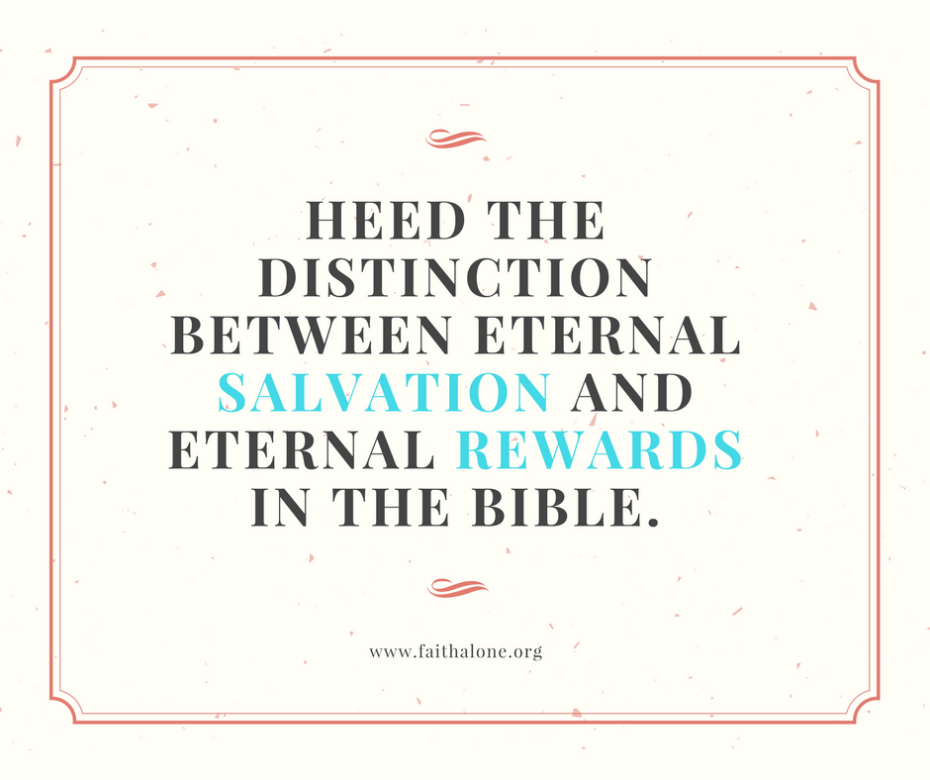I received this excellent email from B in California:
I find it interesting that so many churches or denominations do not see the many references to rewards in the Bible. As a result, sometimes it affects their interpretation of a passage of Scripture.
My initial thoughts go like this:
- the New Testament writers understood the differences between salvation issues and fellowship issues.
- over the next several hundred years the reward message was eclipsed by various heresies.
- the Catholic church focused the church on political issues.
- the Reformation refocused the issues on salvation and Lordship issues relating to salvation.
God has used the Free Grace message in the last years to distinguish between salvation and reward issues.
I really enjoy reading your blog messages. They help me contrast the doctrinal messages we hear around us with a more clarified gospel/discipleship message.
The questioner covers the subject well. I definitely agree that the authors who followed the Apostles (called the Apostolic Fathers) lost the distinction between salvation as a free gift and rewards as earned. For them salvation was earned—and kept—by work done. See Thomas F. Torrance’s book, The Doctrine of Grace in the Apostolic Fathers.
While Calvin and Luther had a grasp of the distinction between salvation and rewards, most of their followers quickly abandoned the idea of eternal rewards. With that loss was a loss in clarity on what one must do to have everlasting life.
But there was a controversy in Reformed circles in Scotland in the 18th century called the Marrow Controversy. It was based on an earlier book called The Marrow of Modern Divinity. That book advocated a Free Grace understanding of the distinction between eternal salvation and eternal rewards.
Many prior to the twentieth century spoke about this important distinction including Robert Sandeman, John Glass, John Nelson Darby, C. H. MacIntosh, and a host of Plymouth Brethren writers.
I think you are being too gracious when you say that a failure to recognize this distinction “sometimes affects their interpretation of a passage of Scripture.”
Miss this distinction and your interpretation of Scripture will be off a lot. Not just a passage here or there. Entire books are misunderstood. See here for an article discussing the importance of this distinction.
Take James as an example. He has a strong emphasis on the Judgment Seat of Christ and eternal rewards (e.g., Jas 2:13; 3:1; 5:9). Yet most today think that James is threatening false professors with eternal condemnation. Work harder or you’ll end up in the lake of fire is what many think James is saying.
First John is another illustration. John is concerned about believers having confidence and shrinking back in shame before the Lord Jesus when He returns (1 John 2:28). That is the theme of the entire letter. See also 1 John 4:17-19 where John refers to the believer’s “day of judgment.” Sadly, most miss that and think that John is giving a series of tests that help a person look at his works and decide if he is more or less likely to be one who will actually make it into Christ’s kingdom.
Hebrews is a call to born-again Jews to become Christ’s partners (metochoi) in the life to come (Heb 1:9, 14; 3:14). Yet most think the author is warning immature Christians that their works may not be good enough to get them into the kingdom.
There is hardly a book in the Bible that is not misunderstood if this distinction is not understood.
I remember when I was at DTS I ran across a 1938 book by Sale-Harrison called, The Judgment Seat of Christ: A Truth That Every Christian Should Know. I was just starting to learn about rewards truth and I found that book to be absolutely right.
My Christian life became much more fulfilling and exciting when I gained an appreciation for eternal rewards. I know yours has as well.
See this article by Zane Hodges in which he stresses the importance of believing in eternal rewards.
It is possible, of course, to know that everlasting life is a free gift and that faith in Christ is the sole condition of everlasting life and yet not be clear about eternal rewards. I was like that for the first six years of my Christian life. It wasn’t until my second year in seminary that eternal rewards finally made sense to me. Before that I had no good explanation for a lot of texts. After I learned of the distinction, the Bible came alive for me. Many of the passages that once befuddled me now made sense.
In light of 1 Cor 9:27 and 2 Cor 5:11, it seems that we are not only to be evangelists about the free gift of everlasting life. We are also to joyfully share the message that all believers will appear at the Judgment Seat and will receive recompense for the things done in the body, whether good or bad. We are to beseech unbelievers to believe in Christ for everlasting life and believers to live wholeheartedly for Christ for everlasting rewards.
Keep on making this distinction plain. Doing so is crucial to have what Paul calls “the mind of Christ”(1 Cor 2:16).


